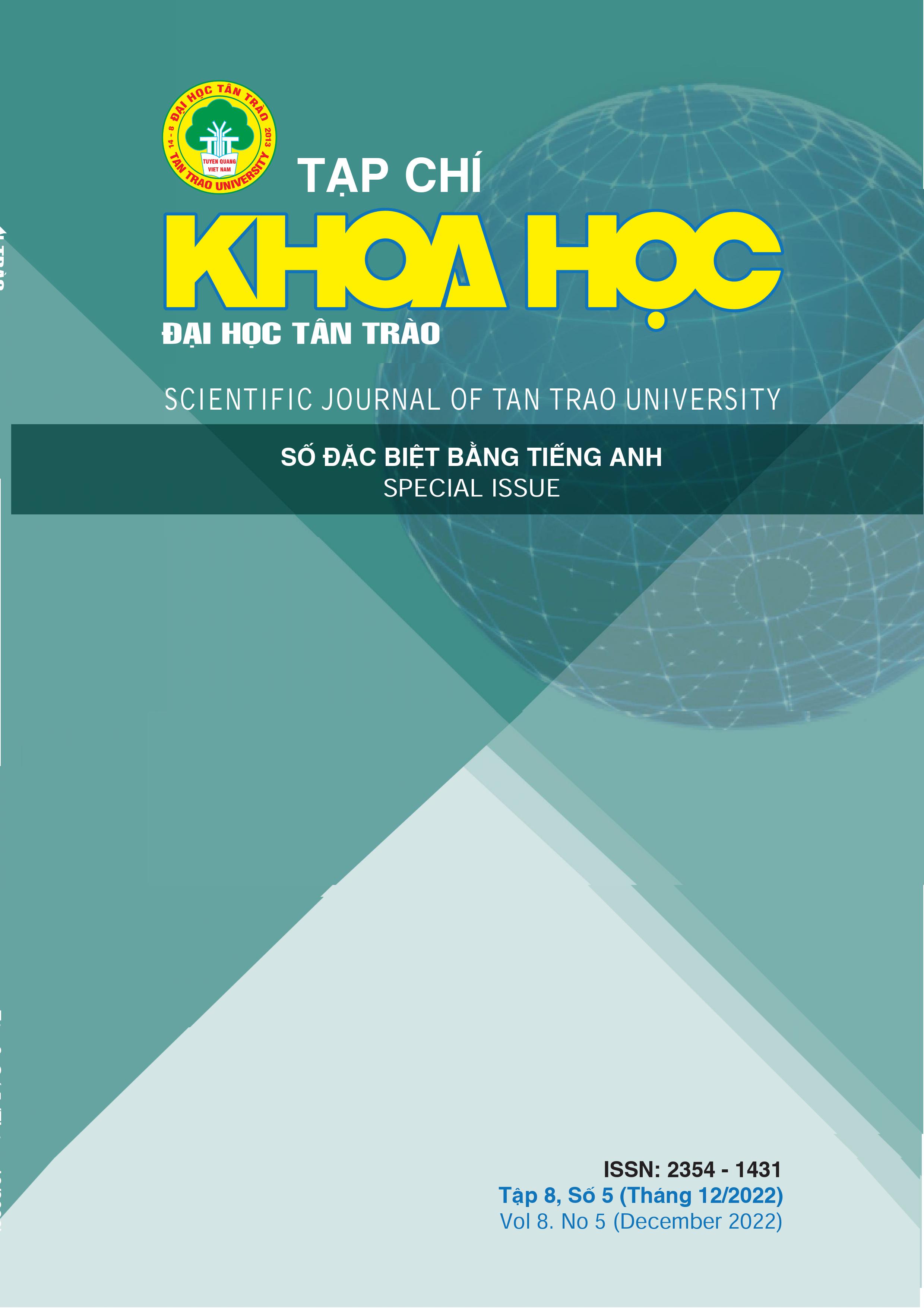CHIẾN LƯỢC PHÁT TRIỂN KỸ NĂNG NÓI TIẾNG ANH CỦA SINH VIÊN NĂM THỨ NHẤT CHUYÊN NGÀNH TIẾNG ANH TẠI MỘT CƠ SỞ GIÁO DỤC ĐẠI HỌC
DOI:
https://doi.org/10.51453/2354-1431/2022/873Từ khóa:
chiến lược, sinh viên chuyên ngành tiếng Anh; cơ sở giáo dục đại học; thực tiễn sư phạm; phương thức chính giao tiếp quốc tếTóm tắt
Kỹ năng nói tiếng Anh được coi là kỹ năng cần thiết quan trọng nhất để sử dụng thành thạo vì kỹ năng nói được sử dụng làm phương thức giao tiếp quốc tế chính. Đa số người học thấy khó thành thạo các kỹ năng này do các chiến lược học dường như không hiệu quả. Nghiên cứu này đã khảo sát các chiến lược nói tiếng Anh của sinh viên năm thứ nhất chuyên ngành tiếng Anh tại Đại học Luật Hà Nội trong kỳ 2 của năm học 2021-2022. Nghiên cứu sử dụng phương pháp định lượng mô tả với bảng câu hỏi do nhà nghiên cứu thực hiện cho 68 người trả lời thông qua bảng trả lời trực tuyến trong ứng dụng Google. Kết quả cho thấy rằng sinh viên đã không xác định được các chiến lược hiệu quả để cải thiện kỹ năng nói của họ. Họ nên được trang bị các chiến lược nâng cao liên quan đến cách cải thiện kỹ năng nói của họ một cách hiệu quả. Nghiên cứu này sẽ giúp các nhà quản lý trường học điều chỉnh mục tiêu chương trình và kết quả giảng dạy của họ để sửa đổi các chương trình hiện có của họ, giáo viên thay đổi thực hành sư phạm của họ, gợi ý cho sinh viên một số chiến lược nói tiếng Anh hiệu quả.
Tải xuống
Tài liệu tham khảo
REFERENCES
/[1]. Zare, P. (2012). Language learning strategies among EFL/ESL learners: A review of literature. International Journal of Humanities and Social Science, 2(5), 162-169. http://www.ijhssnet.com/journals/Vol_2_No_5_March_2012/20.pdf
/[2]. Szmigiera, M. (Mar 30th, 2021). The most spoken languages worldwide 2021. https://www.statista.com/statistics/266808/the-most-spoken-languages-worldwide/ 1975
/[3]. Nurdin, I., Fidyati, F., Kumalasari, D., & Rasyimah, R. (2018). The overview of motivational theories in second language acquisition. Proceedings of The 8th Annual International Conference (AIC) on Social Sciences, Syiah Kuala University 2018 September 12-14, 2018, Banda Aceh, Indonesia, 292–298. http://www.jurnal.unsyiah.ac.id/AICS-Social/article/download/12689/9795
/[4]. Marmoah, S. (2017). The strategies of English lectures' in teaching speaking. Journal of Research in English Language Teaching, 1(1), 23-37. https://jrelt.ftk.uinjambi.ac.id/index.php/jrelt/article/view/5/3
/[5]. Heriansyah, H. (2012). Speaking problems faced by the English Department students of Syiah Kuala University. Lingua Didaktika, 6(1), 37-44. https://doi.org/10.24036/ld.v6i1.7398
/[6]. Dang, T. T. (2010). Learner autonomy in EFL studies in Vietnam: A discussion from sociocultural perspective. English Language Teaching, 3(2), 3-9. https://doi.org/10.5539/elt.v3n2p3
/[7]. Oxford, R. L. (1990). Language learning strategies: What every teacher should know. New York: Newbury House
/[8]. Cabaysa, C. C., & Baetiong, L. R. (2010). Language learning strategies of students at different levels of speaking proficiency. Education Quarterly, 68(1), 16-35. https://journals.upd.edu.ph/index.php/edq/article/view/2131
/[9]. O’Malley, J. M., & Chamot, A. U. (1990). Learning Strategies in Second Language Acquisition. Cambridge: Cambridge University Press. http://dx.doi.org/10.1017/CBO9781139524490
/[10]. Dornyei, Z., & Taguchi, T. (2010). Questionnaires in Second Language Research: Construction, Administration and Processing (2nd ed.). New York: Routledge. https://www.english-efl.com/wp-content/uploads/2020/12/questionnaires-in-second-language-research.pdf
/[11]. Brown, H. D. (2000). Principles of Language Learning and Teaching (4th Ed.). New York: Addison Wesley Longman, Inc.
/[12]. Brown, P., & Scase, R. (1994). Higher education and corporate realities: Class, culture and the decline of graduate careers. Routledge.
/[13]. Benson. P (2001). Teaching and Researching Autonomy in Language Learning. Harlow: Pearson Education Limited.
Tải xuống
Đã Xuất bản
Cách trích dẫn
Số
Chuyên mục
Giấy phép

Tác phẩm này được cấp phép theo Giấy phép Quốc tế Creative Commons Attribution-ShareAlike 4.0 .
Bài báo được xuất bản ở Tạp chí Khoa học Đại học Tân Trào được cấp phép theo giấy phép Ghi công - Chia sẻ tương tự 4.0 Quốc tế (CC BY-SA). Theo đó, các tác giả khác có thể sao chép, chuyển đổi hay phân phối lại các bài báo này với mục đích hợp pháp trên mọi phương tiện, với điều kiện họ trích dẫn tác giả, Tạp chí Khoa học Đại học Tân Trào và đường link đến bản quyền; nêu rõ các thay đổi đã thực hiện và các nghiên cứu đăng lại được tiến hành theo cùng một bản quyền.
Bản quyền bài báo thuộc về các tác giả, không hạn chế số lượng. Tạp chí Khoa học Tân Trào được cấp giấy phép không độc quyền để xuất bản bài báo với tư cách nhà xuất bản nguồn, kèm theo quyền thương mại để in các bài báo cung cấp cho các thư viện và cá nhân.
Mặc dù các điều khoản của giấy phép CC BY-SA không dành cho các tác giả (với tư cách là người giữ bản quyền của bài báo, họ không bị hạn chế về quyền hạn), khi gửi bài tới Tạp chí Khoa học Đại học Tân Trào, tác giả cần đáp ứng quyền của độc giả, và cần cấp quyền cho bên thứ 3 sử dụng bài báo của họ trong phạm vi của giấy phép.






